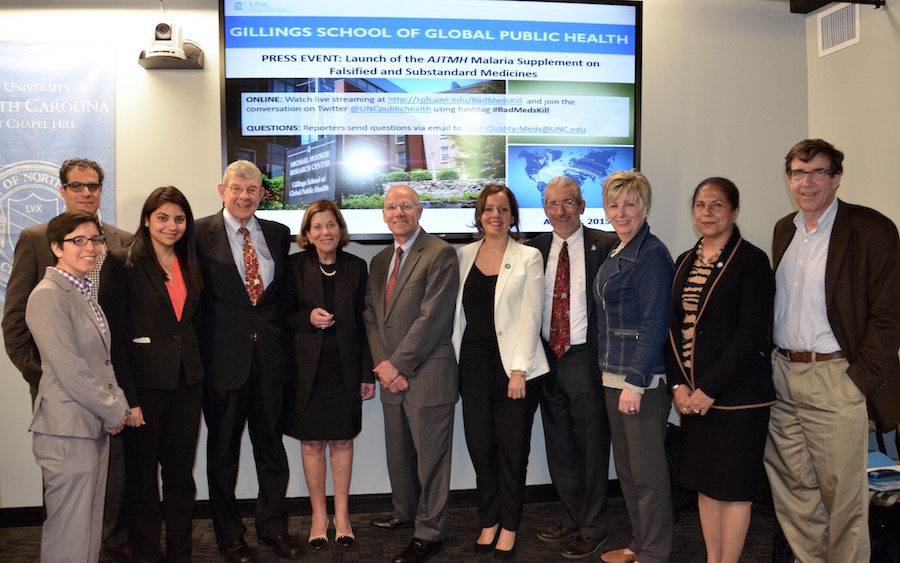4 billion at risk from substandard meds; researchers tackle the challenge
April 21, 2015
Falsified and low-quality medicines represent a public health pandemic, but – until recently – not many researchers were discussing solutions to the challenge.
That changed April 20, with the online publication of “The Global Pandemic of Falsified Medicines: Laboratory and Field Innovations and Policy Perspectives,” a 17-article supplement of The American Journal of Tropical Medicine and Hygiene (AJTMH).

Participants at the supplement launch included (l-r) Naya Villarreal, Dr. Amin Attaran, Gaurvika Nayyar, Dr. Joel Breman, Dean Barbara K. Rimer, Dean Robert Blouin, Patricia Tabernero, Dr. Jim Herrington, Karen Goraleski, Dr. Harparkash Kaur and Dr. Steve Meshnick.
The UNC-Chapel Hill Gillings School of Global Public Health hosted a live webinar to accompany the supplement launch. Several authors of papers in the supplement participated, both in Chapel Hill and virtually, in a discussion about falsified and substandard medicines.
Jim Herrington, PhD, Professor of the Practice of health behavior and executive director of the Gillings Global Gateway™ at the Gillings School, co-edited the supplement, co-authored one of the included studies and facilitated the webinar.
“The pandemic of falsified and substandard medicines is pervasive and underestimated, particularly in low- and middle-income countries where drug regulatory systems are weak or nonexistent,” said Herrington. “Fortunately, this supplement offers a discussion of techniques for detecting falsified medicines and specific policy recommendations, including an international convention – much like that for tobacco control – and a model law to address the pandemic.”
Fake and substandard drugs are responsible for tens of thousands of deaths around the globe each year. Poor-quality medicines not only leave people with serious illness untreated but also are estimated to kill more than 120,000 children with malaria each year.
Malaria was in the spotlight during the webinar. The same artemisinin-based compound therapies (ACTs) that have reduced malaria deaths on a global scale are now among the most frequently falsified drugs.
Around the world, four billion people live in countries where ineffective, falsified and substandard drugs are sold as genuine. While the pandemic has the greatest impact in low- and middle-income countries, it also affects the United States and other developed nations.
Amir Attaran, DPhil, LLB, associate professor of law and medicine and Canada Research Chair in law, population health and global development policy at the University of Ottawa, noted that 80 percent of medicines sold in the U.S. are imported from countries in which drug quality is not regulated. When problems arise due to poor-quality or falsified medicines, it is difficult to prosecute manufacturers if their home countries have no relevant laws.
The scope of the problem of falsified medicines – estimated to be a $75 billion per year criminal enterprise – is further augmented by global use of the Internet to purchase medicines, commented Barbara K. Rimer, DrPH, Alumni Distinguished Professor and dean of the Gillings School.
One paper in the supplement found that, of almost 17,000 samples of antibiotics, antimalarial and anti-tuberculosis drugs, up to 41 percent failed to meet minimum quality standards.
The following experts, authors and co-editors also spoke during the supplement launch:
- Robert Blouin, PharmD, dean of the UNC-Chapel Hill Eshelman School of Pharmacy;
- Joel Breman, MD, AJTMH supplement co-editor, senior scientist emeritus at the National Institutes of Health’s Fogarty International Center;
- Harparkash Kaur, PhD, lecturer of pharmacology at the London School of Hygiene and Tropical Medicine;
- Steve Meshnick, MD, PhD, professor of epidemiology at the Gillings School;
- Gaurvika Nayyar, MBA, MPH, AJTMH supplement co-editor, program manager for the U.S. Pharmacopeial Convention; and
- Patricia Tabernero, MSc, MPh, program manager of the Worldwide Antimalarial Resistance Network at the University of Oxford.
“This problem continues to spread globally, creating an even greater challenge to cooperation among stakeholders, many with limited resources,” said supplement co-editor Breman, who is called “the Ebola hunter” for his work during the first known Ebola outbreak in 1976. “The need is urgent for collaboration among those with expertise in policy, science, technology, surveillance, epidemiology and logistics, in order to secure global supply chains.”
.
Gillings School of Global Public Health contact: David Pesci, director of communications, (919) 962-2600 or dpesci@unc.edu.
